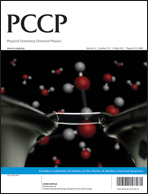Time-dependent quantum dynamical simulations of C2 condensation under extreme conditions
Abstract
We report theoretical studies of the initial phase of bulk C2 condensation into carbon nano-structures by means of Born–Oppenheimer and time-dependent quantum mechanical Liouville–von Neumann molecular dynamics based on the density-functional tight-binding (DFTB) framework for electrons. We observe that the time-dependent quantum mechanical approach leads to faster formation of

- This article is part of the themed collection: Ultrafast chemical dynamics

 Please wait while we load your content...
Please wait while we load your content...